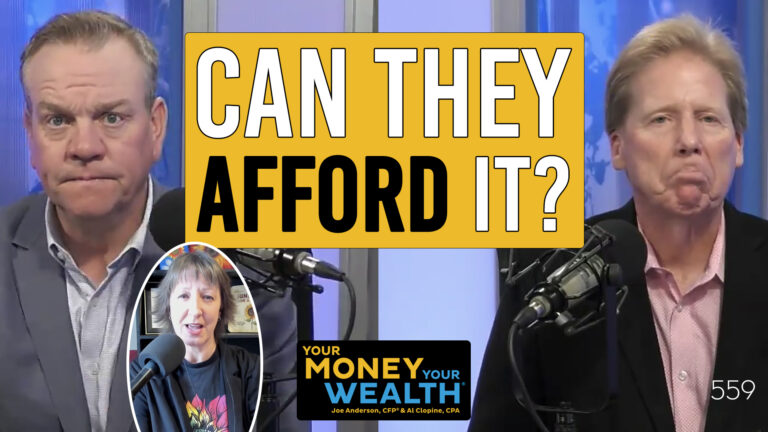J. David Stein, host of popular podcast “Money for the Rest of Us” joins the show to talk about, you guessed it, money. Joe Anderson, CFP® and Alan Clopine, CPA interview Stein on the state of the markets after the nomination of President-elect Trump.
Stein sheds light on failed market forecasts and how this past week demonstrated two points. First, you can’t predict future outcomes, and second, you especially can’t predict how the markets will react to those outcomes. Joe responds with the importance of ignoring short-term market volatility and instead, focus on your long-term goals when investing.
3:14 “We have two more topics, estate planning and IRAs. One of Trump’s proposals is to get rid of estate taxes.”
3:30 “Right now under current law if you were to pass away, your beneficiaries would receive your assets with no estate tax if your estate is less than about $5.45 million. So if your estate is $10 million and you’re single, well some of that is going to be subject to an estate tax at 40% and some of it will come tax-free.”
4:00 “Donald Trump would like to get rid of estate taxes altogether which is a huge saving for families that have a lot of assets, a lot of wealth, but there’s a negative to that and I want to explain that.”
4:10 “The last time we didn’t have an estate tax was 2010, for one year, and we’ve had the estate tax basically since the Civil Year.”
5:00 “Here’s what’s interesting about estate taxes is because the government doesn’t want to tax an estate twice. There’s an estate tax and then there’s a step-up in basis for the next generation which means that any asset that you hold outside of a retirement account gets a step-up in cost basis to the value at date of death. So you bought a home for $100,000 and now it’s worth $1,000,000 and your kids get the home, because it’s under the exemption limit, it’s as if they bought it for $1,000,000. They turn around and sell it right there and there’s no gain or loss. The reason for the step-up is so you don’t pay estate taxes and capital gains on the same property. Now if there is no estate tax, there may not be a step-up in basis.”
6:20 “Last thing when it comes to estate planning which will affect just about everyone listening is retirement accounts…..right now there is something that’s called the Stretch IRA. What that means is if your IRA goes to a non-spouse beneficiary, they have the right to stretch out the tax liability of that account for their lifetime. Once they inherit it, it’s going to be taxed at ordinary income rates….right now they have the ability to stretch the tax out over their life. So it’s a very favorable tax law for us individuals that inherit retirement accounts.”
8:22 “What is probably going to happen, is what some experts say, first quarter next year – first 100 days, is that the [Stretch IRA] is gone.”
9:46 Start of interview with J. David Stein
11:00 Joe Anderson: “Given this week, we had a lot of experts on their toes a little bit. Donald Trump is now our President…as Donald Trump was pulling ahead, you was the futures go down 700 points so everyone’s thinking, oh man the market is going to crash. The week has been okay. I mean how the heck do we explain that?”
11:25 J. David Stein: “We explain that by saying, you cannot predict these one-off events. I had listeners expressing concern; if Donald Trump gets elected the market is going to crash, should I be pulling my money out? Now this was a month or two ahead of time. My response was, for one-off events you just can’t predict what the reaction is going to be.
12:00 J David Stein: “Now what I teach is to adjust one’s asset allocation for what I call regime changes. Where the risk of a recession is high, the risk of a 20% type decline in the stock market is high.”
12:42: Joe Anderson: “We’re emotional creatures and I think that’s one of the biggest things from an education perspective. It’s that you cannot worry about this short-term volatility. What’s the goal for the money? You probably need it for your retirement over the next 10-20-30-40 years. We’ll have many more presidents, we’ll have many more corrections and we’ll have many more crises and everything else.”
14:15 J David Stein: “My insurance company had a 50% proposed increase for our health insurance. So that got me thinking, what’s going on here? What is driving these dramatic increases in health insurance cost? Turns out, much of it is pharmaceutical.”
15:20 Alan Clopine: “What is some of the best advice you would give to someone who is about to retire?”
15:54 J David Stein: “What I tell retirees is to find a source of income outside of investing. Have a lifestyle business or something of interest.”
17:00 J David Stein: “One can’t even imagine a 40-year retirement, I mean we can’t comprehend what that’s even like.”
19:50 End of interview with J David Stein. Visit moneyfortherestofus.net to hear more from J David Stein
Listen to the YMYW podcast:

Amazon Music
AntennaPod
Anytime Player
Apple Podcasts
Audible
Castbox
Castro
Curiocaster
Fountain
Goodpods
iHeartRadio
iVoox
Luminary
Overcast
Player FM
Pocket Casts
Podbean
Podcast Addict
Podcast Index
Podcast Guru
Podcast Republic
Podchaser
Podfriend
PodHero
podStation
Podverse
Podvine
Radio Public
Rephonic
Sonnet
Spotify
Subscribe on Android
Subscribe by Email
RSS feed

YouTube Music
IMPORTANT DISCLOSURES:
Pure Financial Advisors is a registered investment advisor. This show does not intend to provide personalized investment advice through this broadcast and does not represent that the securities or services discussed are suitable for any investor. Investors are advised not to rely on any information contained in the broadcast in the process of making a full and informed investment decision.
• Investment Advisory and Financial Planning Services are offered through Pure Financial Advisors, LLC, a Registered Investment Advisor.
• Pure Financial Advisors LLC does not offer tax or legal advice. Consult with your tax advisor or attorney regarding specific situations.
• Opinions expressed are not intended as investment advice or to predict future performance.
• Past performance does not guarantee future results.
• Investing involves risk including the potential loss of principal. No investment strategy can guarantee a profit or protect against loss in periods of declining values.
• All information is believed to be from reliable sources; however, we make no representation as to its completeness or accuracy. As rules and regulations change, content may become outdated.
• Intended for educational purposes only and are not intended as individualized advice or a guarantee that you will achieve a desired result. Before implementing any strategies discussed you should consult your tax and financial advisors.
CFP® – The CERTIFIED FINANCIAL PLANNER™ certification is by the Certified Financial Planner Board of Standards, Inc. To attain the right to use the CFP® designation, an individual must satisfactorily fulfill education, experience and ethics requirements as well as pass a comprehensive exam. Thirty hours of continuing education is required every two years to maintain the designation.
AIF® – Accredited Investment Fiduciary designation is administered by the Center for Fiduciary Studies fi360. To receive the AIF Designation, an individual must meet prerequisite criteria, complete a training program, and pass a comprehensive examination. Six hours of continuing education is required annually to maintain the designation.
CPA – Certified Public Accountant is a license set by the American Institute of Certified Public Accountants and administered by the National Association of State Boards of Accountancy. Eligibility to sit for the Uniform CPA Exam is determined by individual State Boards of Accountancy. Typically, the requirement is a U.S. bachelor’s degree which includes a minimum number of qualifying credit hours in accounting and business administration with an additional one-year study. All CPA candidates must pass the Uniform CPA Examination to qualify for a CPA certificate and license (i.e., permit to practice) to practice public accounting. CPAs are required to take continuing education courses to renew their license, and most states require CPAs to complete an ethics course during every renewal period.










